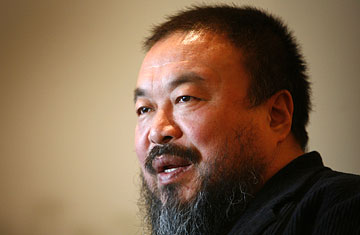
Ai Weiwei attends an opera premiere in Germany in October 2009
Chinese artist Ai Weiwei was released on Sunday night from a two-day house arrest in Beijing that was intended to block him from attending a party at his studio in Shanghai. The party, which went on without the host, was to mark the structure's impending demolition. Shanghai authorities, who had invited Ai to build a studio on farmland in the city's Jiading district, told the artist that the building had been deemed illegal and needed to be removed.
In recent years, Ai has been one of China's most visible artists. He was one of the designers of the Beijing National Stadium (known as the Bird's Nest), the centerpiece of the 2008 Summer Olympics. Last month he completed an installation of 100 million porcelain sunflower seeds in the Turbine Hall of the Tate Modern in London.
He has also become one of the Chinese government's most vocal critics. Ai believes the demolition order was in retaliation for a pair of documentaries he produced that riled the Shanghai government. One was about a man who killed six Shanghai police officers in 2008, and the other about a Shanghai activist who lived in the Tokyo airport while he wasn't allowed to return home. "They were very embarrassed," Ai says. "They pictured me as trouble for them even though they invited me before the Olympics to build my own studio."
Ai had previously posted a party invitation on Twitter, and said he received more than 1,000 responses within a day from people who wanted to come. Ai planned to serve river crabs, whose name — he xie — is a homophone for "harmonious," a buzzword for the current Chinese leadership. The word has been adopted by some Chinese Web users as a synonym for censorship. Despite their host's absence, about 800 people attended the party. "I was very impressed," Ai says. "This shows that this time, people have confidence and are much less intimidated by authority and believe they have rights."
Ai's house arrest was brief, but his detention reflects a difficult climate that has confronted Chinese activists since imprisoned literary critic Liu Xiaobo was awarded the Nobel Peace Prize last month. Liu's wife, Liu Xia, has been under house arrest since the award was given and is now unable to receive telephone calls or visitors outside of her immediate family. Many supporters of Liu Xiaobo have been contacted by police in recent weeks, including signers of Charter 08, the political-reform manifesto he co-authored. The 4,000-word document was a key piece of evidence in his December 2009 conviction and 11-year sentence for "inciting subversion of state power."
Zhang Hui, a Chinese legal activist, late last month compiled a list of 39 people in China who had been put under house arrest at some point following the Oct. 8 announcement of the Peace Prize, according to Human Rights in China, an NGO. They include Ding Zilin, co-founder of the group Tiananmen Mothers, and her husband Jiang Peikun; the blogger Liu Di; and Yu Jie, author of a recent book that is critical of Chinese Premier Wen Jiabao.
China's state-controlled press gave Liu's Nobel Peace Prize scant notice in the days after it was awarded, but in recent weeks official media outlets have launched vitriolic assaults on the award and Liu. One recent article accused the onetime Tiananmen Square protest leader of "contempt for China and its people." Cui Tiankui, a Chinese Vice Foreign Minister, told reporters last week that nations would "bear the consequences" if they chose to support the Nobel Peace Prize, which he called a political tool that was used to challenge China. His warning comes amid reports that China has warned European diplomats to avoid the Dec. 10 Peace Prize ceremony in Oslo.
Liu's supporters in China will face even more obstacles to attending the event in the Norwegian capital. In an open letter, Liu Xia acknowledged that she likely won't be allowed to leave the country to accept her husband's prize and invited 140 Chinese lawyers, writers, former officials and others whom she called Liu's "friends and peers" to attend the event in his place. Pu Zhiqiang, a human-rights lawyer who signed Charter 08, was one of Liu Xia's invitees. He was detained for three days following the Peace Prize announcement, and is now followed by a police officer when he travels for work. "I want to go to the ceremony, but I can't. It's no use," he told TIME. "I don't think they will allow anybody to go."
Of the Chinese activists invited by Liu's wife, the few who are now overseas may be the only ones who can attend. Dai Qing, a writer and environmentalist who is now on a fellowship in Canada sponsored by the environmental group Probe International, said she would go in place of her fellow activists who were barred from traveling. "I shall tell the world that it is not true that no Chinese citizen who fights against authoritarianism will be able to attend the grand ceremony in Oslo," she wrote in a statement posted on Probe International's website. "If necessary, I will go there to fulfill my duty to my friend." As with Ai Weiwei's river-crab-eating supporters, Liu's allies are determined to not let detention and house arrest stop a celebration.
